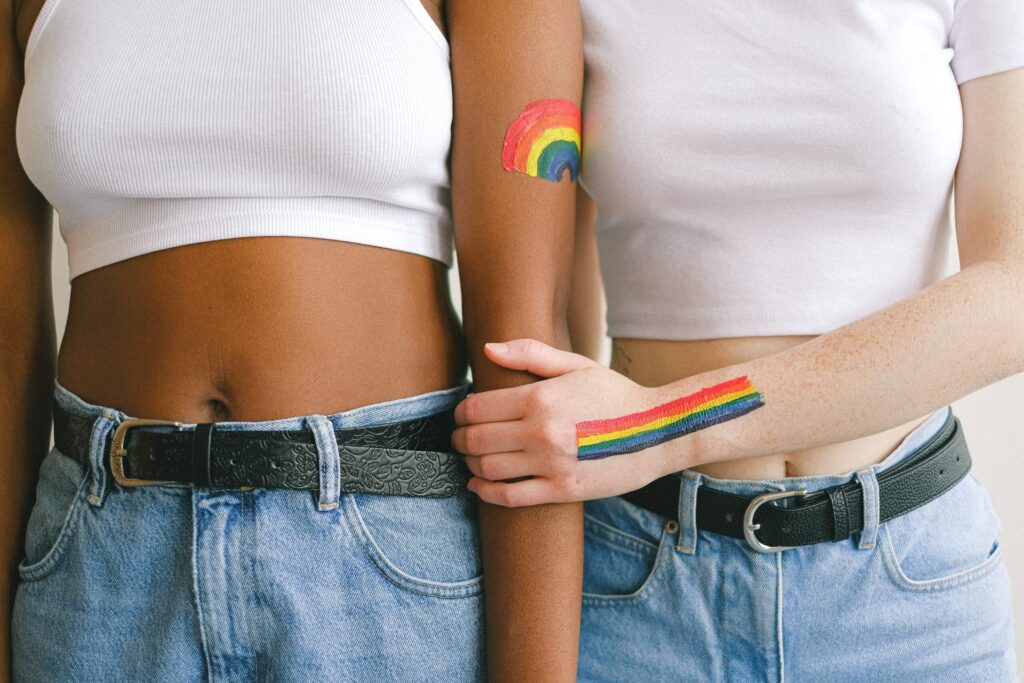Identifying your queer identity
Navigating your sexuality or gender identity can feel like an incredibly confusing experience. In a world where a boy loving a girl or vice versa is often seen as the norm, it can be a scary experience for those of us that realize we don’t fit the common mold. You may be having thoughts about loving the same gender or possibly feel that you don’t identify fully with your assigned gender.
Having questions about your identity can bring a sense of confusion, especially when going through other growing pains. It’s not uncommon to hear statements like, “being gay is a phase” or “you’re too young to have a crush” when bringing up your queer identity to an adult. You may experience doubt surrounding the feelings you’re experiencing and second guess yourself.
In reality, by the time many reach adolescence, they already have a good idea of what their sexuality and gender identity is. Recognizing your feelings are a great first step into exploring your queer identity. There’s no such thing as being too young to know your sexuality, and if you experience any of the signs here, you are valid in coming one step closer to expressing your true self.
Download HER app
Do You Suspect That You’re Queer?
Maybe that girl in your science class makes you feel all warm and fuzzy inside in more than a friendly way. Maybe that boy you’ve been best friends with for years is attractive to you in a romantic way. Maybe you were born a girl but don’t feel a strong affinity to any specific gender. Maybe you were born a boy but have always strongly felt out of place in the male body.
These thoughts may leave you feeling alone, but understanding the LGBTQ+ spectrum can help to give a name to these feelings and find community. With more than ten million people in the United States identifying as LGBTQ+, you’re certainly not alone in your feelings.
You may be unfamiliar with some of the labels used for queer identities including lesbian, bisexual, gay, and transgender. These are some of the most common ways to identify outside of the heteronormative spectrum.
Starting off you also may not know exactly which label you identify with, or potentially not identify with one specific one. Queer can be used as an identifier outside of being straight or cisgender.
All of these terms may have your head spinning, but before getting into them, it’s important to understand some signs that you may be queer.
Signs You May Be Queer
At this point, you may have had thoughts that maybe you’re not straight after all. You may realize that you feel differently than some of your friends or that you’re hiding your true feelings to fit in. It’s not uncommon to feel like you have no one to relate to, although more people probably have the same questions as you think.
It’s not uncommon to have an upbringing that makes you feel that these views are taboo which can cause you to push them even further away from the surface. It’s important to understand that it is completely okay to have feelings that deviate from the norm and those feelings should be embraced.
There’s no comprehensive list of signs that you may be queer but some things that may indicate these feelings are:
- Physical attraction to someone of the same gender.
- Strong emotional feelings for someone of the same gender.
- Feeling restricted by your gender identity.
- Strong feelings of being in the wrong body.
- Lack of romantic or sexual feelings at all.
- No identification to any traditional gender roles.
While none of these is necessarily an indicator alone that you are queer, it’s a great starting point to evaluate your feelings more.
What Are Some LGBTQ+ Identities?
You may have heard some different labels to identify yourself floating around but have no idea what they mean. It can be helpful to know the different labels to give some context to your feelings. Of course, you don’t have to identify by any label if you prefer and you also may identify with more than one label.
First, it’s important to understand the difference between sexual orientation and gender identity. Sexual orientation is how you characterize your sexuality, while gender identity is how you feel or express your gender, it doesn’t have to match your gender assignment at birth.
There are different ways to characterize your sexual orientation such as:
- Gay: Being emotionally and/or sexually attracted to their own gender.
- Lesbian: A woman emotionally and/or sexually attracted to other women.
- Pansexual: Sexual, romantic, or emotional attraction toward people regardless of their sex or gender identity.
- Asexual: A person who doesn’t fit traditional standards and expectations around sexual desire. Asexual people may still be sexually active but still masturbate, or have an attraction to people, but not desire sex.
🌈 Learn more about bisexual dating and how to connect now with bi, queer and open-minded folks.
It’s also important to understand some ways to characterize your gender identity if you desire to:
- Transgender: A person whose gender identity differs from their sex assigned at birth.
- Non-binary: Someone who doesn’t identify exclusively as male or female.
- Genderqueer: People who embrace fluid ideas of gender and sexual orientation.
- Agender: A person who doesn’t identify as any particular gender.
It’s Okay to Be Unsure
The most important thing to note is that it’s okay to be unsure of exactly which label you want to identify as. It’s not uncommon to use one label in adolescence but realize later that you may closer identify with another label.
It’s also okay to have questions or not perfectly fit into one category. Sexuality and gender are a spectrum and it’s up to you to identify how you see fit. Don’t doubt yourself when it comes to your feelings though. Sexual and gender identities are believed to be determined as soon as childhood, so you know yourself best.
If you do feel unsure of your feelings, finding a therapist who you can trust can help you talk through your feelings and gain clarity. Having a supportive community, whether online or in-person can also make the journey go a lot smoother.
Find An Awesome Queer Community with HER
HER is a great place to find a loving and open queer community. You’ll be sure to find people that you can relate to, who may be going through similar experiences as you. Join groups or find events to connect with others. You’ll be sure to find your forever person or your chosen family!
Download HER app







